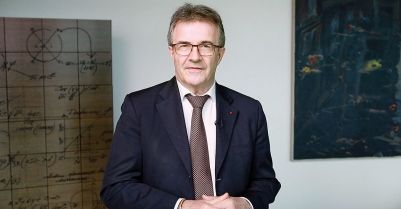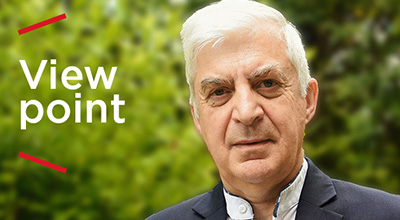-
View article
 #Financial publications
#Financial publicationsPhilippe Brassac discusses the results for the full year and fourth quarter of 2023 as well as the universal banking model
2024/02/08
- #Group Project
- 2020/08/12
- 0
-
10
Viewpoint from Pierre Jacquet on the challenges facing our society
Interview of Pierre Jacquet, member of Crédit Agricole’s Scientific Committee ; President of the Foundation FARM's Scientific Council ; President of the Global Development Network ; economist and professor of political economics.
In your opinion, what big challenges await us in the post-crisis world?
The challenges facing humanity don’t result from the COVID-19 crisis, though the pandemic has made them more obvious. For me, they all have to do with our vision of the world and, more specifically, our vision of sustainable development. The fundamental challenge lies in our failure to properly understand how humanity interacts with its environment, our inability to see the world as a “shared home”, in the words of French anthropologist Philippe Descola.
This interaction between humanity and nature, which is at the heart of sustainable development, is not ideological, nor is it political, technical or scientific; it’s a bit of all those things, and it’s pragmatic. It’s characterised by great complexity, which scientific approaches in numerous disciplines have not yet figured out, and which cannot be reduced to dogmatic positions of any kind; it’s constantly changing in line with practices, behaviours and technical progress. To me, it’s absolutely fundamental that we explore this complexity and build a shared ethic governing the relationships between humanity and nature.
This “shared home” approach is foundational. It implies a collective approach that goes beyond assertions of identity and can only emerge through a strengthening of democracy, acknowledgement of a wide range of perspectives, respect for science and greater awareness of the risks facing our societies and our lives. It also transcends national frameworks and requires collective action between countries. For example, pandemic research is not the preserve of any one country; it’s a global endeavour. Brainpower is global; it’s a global public good. So we need to be coming up with new forms of globalisation and updating how we manage globalisation.
What should our priority be?
In the end, the biggest challenge facing us in the post-COVID period is the “back to normal” trap: the temptation to put the crisis – and the huge social, economic and human shock it’s generated – behind us and pick up right where we left off.
It’s vital that, as “normal” life resumes, we take a step back and think deeply about the challenges facing our society and how we might respond to them.
Given the economic and social fallout of the crisis, isn’t there a risk that the environmental challenges might be sidelined?
That was already a risk before the crisis. It was already apparent that the fight against climate change, environmental protection efforts and work to build the kind of ethic I was talking about earlier were at risk of running out of momentum. However, despite the amazing opportunity for change some think it might offer, the post-crisis period won’t automatically improve things: as the world tries to get back on track, climate-related and environmental concerns may not be at the top of the priority list. Obviously, I hope that isn’t the case.
This is an area where we’re constantly confronted with the difficulty of collective action, both nationally and, to an even greater extent, internationally. “Global public goods” can only be protected if everyone takes action together. We need others to take action. This is a well-known issue when it comes to collective action: we tend to wait for others to act, because without them, our own actions would have no impact. The result is a vicious circle of inaction.
It takes consensus and political momentum to break out of this vicious circle. While scientists have made a lot of progress, I’m not sure we can yet speak of a social consensus. What’s more, the fact that this is a global issue means we really have our work cut out. But we can harness significant positive shifts in mentalities and behaviours, which must be encouraged.
Maintaining our commitment to the climate requires constant vigilance every moment of every day.
What role should financial operators be playing in the environmental transition?
Financial operators have two important roles to play. The first is specific to their business and objectives. I’m thinking, for example, of groups like Crédit Agricole, which has adopted a proactive climate strategy with goals compatible with protecting the climate. Their second role is to influence everyone else, the rest of society. They have an opportunity to show how ethical, green action can create value and help embed a new conception of what this looks like. This is what ultimately creates a dynamic that’s conducive to change.
Innovation in the area of green finance is important because it can help support the transition towards more sustainable development. If such innovation is to flourish, it has to be supported by a stimulating social debate that underpins the political dynamic and the adoption of public policies and regulations that will influence how value is created and become something that all operators have to reckon with.
You sit on the Scientific Committee formed as part of Crédit Agricole’s Societal Project. What made you want to be involved?
I found it interesting that the Crédit Agricole group wanted to have a debate around its climate strategy with input from outside experts. That kind of approach lines up with how I see the challenges of sustainable development and climate change. For me, there are no predetermined or ideological answers. The right way forward is the fruit of complex interaction and discussion involving an extremely wide variety of analyses, disciplines and perspectives. It’s vital that we understand all the different dimensions of the issue, which requires a posture of continuous learning. For me, debate, experimentation and sharing are fundamental principles.
I also hope this Scientific Committee will help highlight the complexity of what needs to be done and document both the foundations for and the constraints upon whatever action needs to be taken. Taking action to protect the climate and the environment is an ongoing commitment that impinges on the real world and is subject to tensions, difficulties and hard choices. This also needs to be brought to the table, which is a tremendous opportunity to explore and account for this complexity together.
What’s your view of Crédit Agricole’s climate strategy?
I applaud Crédit Agricole’s commitment in this area. It’s part of a move to instil new values in society and is helping embed them so they’re reflected in the market, public policy and the interface between the two. It’s this kind of interaction that can help usher in a healthier capitalism. The goal here is to create fresh momentum that will encourage the emergence of new values, which will in turn be reflected in the values of the market. By its very nature, then, this climate strategy goes well beyond the climate and the energy transition.
It also obviously includes agricultural development, a key component of the Group’s identity. If there’s one sector that’s right at the heart of this interaction within our “shared home”, it’s the agricultural sector – a sector where the Group is a key link in the chain.
Thanks to its extensive local presence all over the country, Crédit Agricole is a major operator in France’s financial landscape. This local presence matters, because the impact of actions is more visible at the local level. People feel more concerned about things that affect their local environment, and local action can also make it easier for local stakeholders to get involved.
So there’s a combination of factors which, taken together, enable the Group to influence the message, the political dynamic and the momentum needed to achieve societal change.
To view the Group’s climate strategy, click here.








